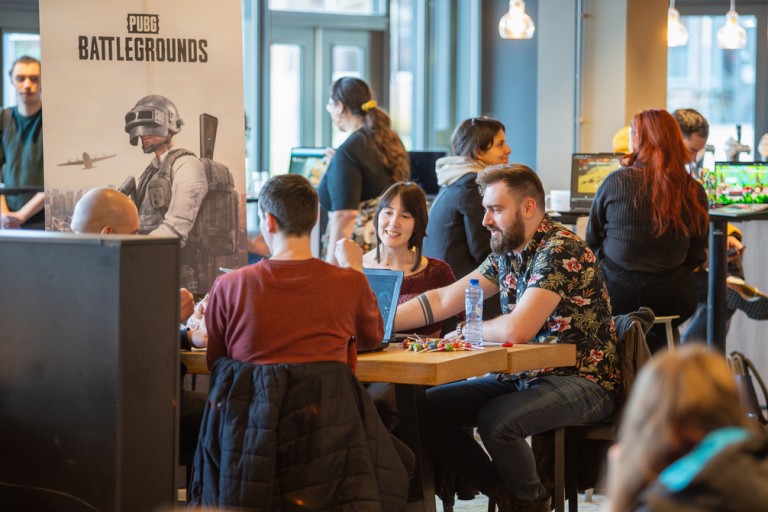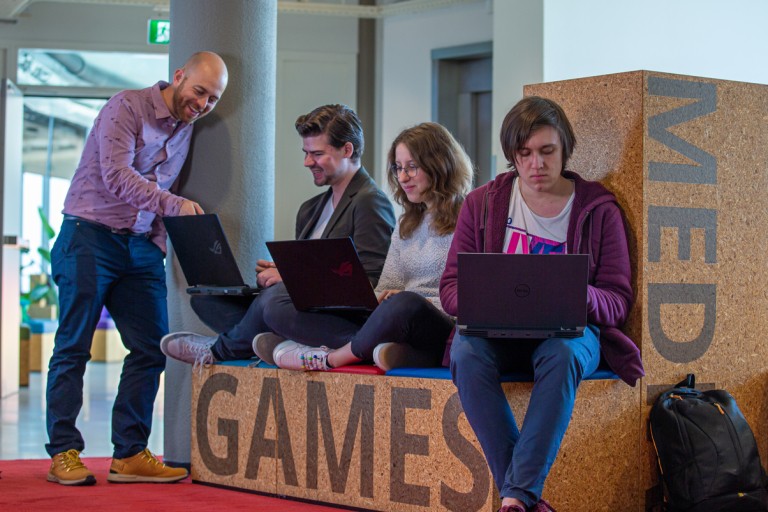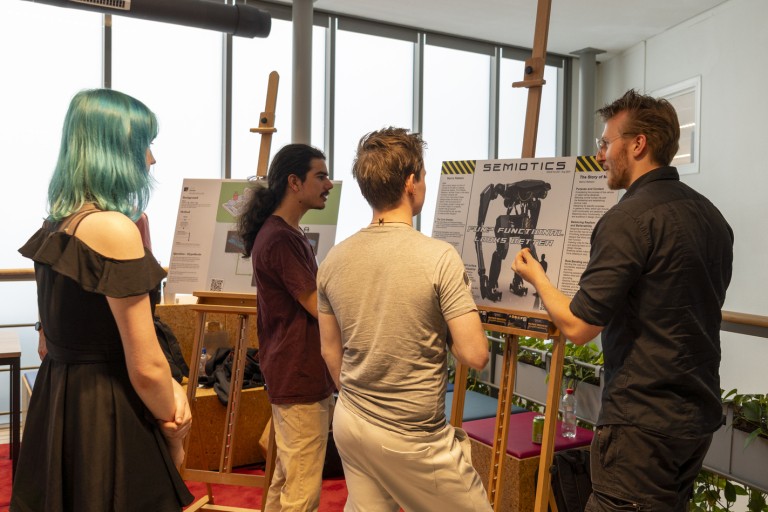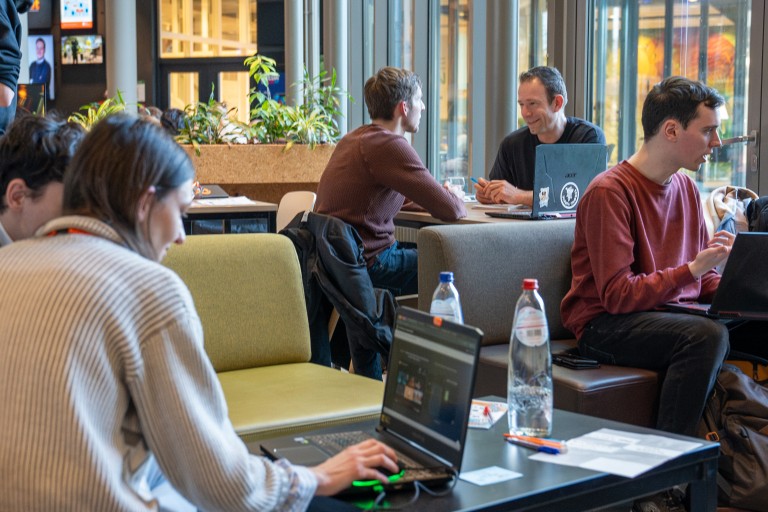Come and meet us
Walking around on campus is the best way to truly experience BUas. Sign up for one of the upcoming events or activities.
Study overview
Master's-level graduates with specialist skills in researching and solving current issues related to the content, creation and culture of video games are in demand in the industry. Do you fancy studying scientific literature, looking for ways to develop practical applications? As it happens, the existing gap between scientific theories and relevant applications offers plenty of opportunities to do so.
This Master in Game Technology is a great opportunity for anyone who wants to gain the very sought-after research skills that the industry is focusing on more and more, while becoming an expert in their chosen field, whether that be art, design, or programming.
- Focus
The Master Game Technology focuses on facilitating your growth in research and development with support from industry partners and expert lecturers from the game industry. Training in research methods allows you to develop deep insights into your chosen area of game development.
- Craftsmanship
Staff of the Master Game Technology consists of industry veterans, trained at master’s or PhD level. This ensures a practical focus, realistic assignments, a large international industry network, and knowledge that is directly applicable to modern game development, along with supervisors that understand academic rigour.
- Research areas
You can enter the programme with your own research proposal that describes the research area you want to work in and as well your current skills and experience in that field. Research areas our programme shows strong expertise in include: procedural content generation, deep learning, animation, graphics, rendering, development and production pipelines, enhanced board games, player experience and data.
- Examples of papers
Sometimes it can be difficult to visualise how you can do research in your sector. Is research in Art even possible? What kind of data could a Design & Production paper yield? What are some interesting developments in the Programming-related fields?
Here you will find some examples of papers written in the Master Game Technology, divided into our three disciplines.
Visual Arts
- Polman, H. - Enhancing the Player Experience Using Real-Time Biometric Data to Adapt a Mood in a Virtual Reality Game Environment
- Habekotté, J. - Framing the Value of Concept Art An insight into the applicability and development of concept art in the game industry
Design and Production
- Pastoors, J. - The Opposite of Love How parasocial interaction with NPCs can be enhanced through intergroup competition
Programming
The programme is structured in four blocks, each consisting of ten weeks. At the end of every block you present your work and progress is evaluated. The work involves both a research thesis and the practical development of artefacts which allow you to gather data and prove the application of your research.
Block A: Concept (15 ECTS credits)
During this first block you will be finetuning your topic of choice and phrasing your research question. You will also learn how to tackle your thesis and do your literature review so you know exactly what has been written on your topic.
Block B: Pre-production (15 ECTS credits)
During the second block you will be describing and planning your research and doing your first tests to check your process.
Block C: Production (15 ECTS credits)
In this block you will conduct your research, collect your data, and interpret it. Your thesis is coming together, and you can see how your initial research question can be answered.
Block D: Release (15 ECTS credits)
Finally, it is time to put in the finishing touches on your work and share your knowledge with the world by publishing your paper.
- Year long graduation
You will have a whole year to work on a specific topic based on your own proposal. Of course, we will assist you in finding a research question that allows you to explore that topic in depth, and all of your assessments are related to that research and work delivered.
- Research and development
We offer courses on a variety of fundamental research and development topics. You attend courses covering general research methodologies, game-related research, and also presentation skills and thesis writing. The curriculum has set sessions for critique, discussions and debates in which students present their project progress and examine each other’s decisions and approaches.
- Industry involvement
We put a strong focus on collaborating with the industry. The industry is involved with reviewing your intake assignment, which can lead to the assignment of an industry supervisor. During the year, the industry is invited to presentations and poster sessions creating valuable moments for feedback.
Would you like to learn more about one of our current applied research projects? You can! The master's programme in Game Technology offers support to students who wish to specialise in the following subjects:
Advanced Graphics Programming with Jacco Bikker
Applied Science approach to real-time, photo-realistic rendering for movies and games, enabling students to access state-of-the-art academic material and to apply theory in the field using state-of-the-art engineering skills.
Current Applied Research with Igor Mayer
Serious Games for Learning and Change: Dive into the design and evaluation of a serious game on a specific topic, such as broad prosperity, poverty, team interactions, and more.
Virtual Humans – Real Emotions
Technical studies, design studies, and user interaction studies of highly realistic Virtual Humans, for instance, in the context of studying Emotions, Charismatic Leadership, Therapy, etc.
Digital Twins (for the Ocean)
Technical development, design studies, and user interaction studies of 3D immersive realities, VR, and AR for Ocean Digital Twinning.
We want you to take ownership and responsibility of your own learning. We strongly promote innovation, possibly in new or unfamiliar environments. During the Master Game Technology, you will work on your thesis and attend various workshops. The focus is on improving your writing and research skills. To support your thesis, you can, for example, create a test environment, but you must already have the skills for this.
You take control over and responsibility for your own learning. We encourage innovation, possibly in new or unfamiliar environments, and often with a concrete product or a series of prototypes and a proof of concept in mind.
You will be assigned an individual tutor with ties to your research area. Need further support? Our researchers and specialists in every conceivable relevant area of game development are at your service!
Guest lectures
Throughout the programme, you will attend guest lectures by various experts who will tell you all about existing and future research practices in game studios and academia. This ensures exposure to up-to-date knowledge. It also gives you the chance to build your professional network even before you enter the industry yourself.
You also have the opportunity to take part in teaching bachelor’s courses, sharing your knowledge with our bachelor’s students. A great advantage is that you can often find enthusiastic participants for your own research among these students.
The Master Game Technology is a one-year, full-time programme. The total study load is 60 ECTS credits. To give you an idea: 1 ECTS credit equals 28 study hours. For this course it is expected you will be putting in 40 hours of work each week.
We offer you a small-scale study environment as the number of students involved in the master's programme is limited. For questions on the content of the programme, lecturers can be easily reached. In addition, the master's coordinator is available to help with day-to-day issues. If you wish to discuss personal problems that may be affecting your life as a student, you can contact the student counsellor.
- A typical week
Below, you will find an example of a typical week. Keep in mind that this schedule may vary each week, and this example serves as an indication.
Monday – Tuesday – Wednesday
Working in the Master Game Technology Lab on your project and meeting supervisors for one-to-one feedback.Thursday
Full day of classes covering research topics and development insights.Friday
Joining several of the workshops focused on your professional specialisation topic.
Student well-being
BUas encourages and helps you to make the most of yourself, whatever your circumstances. Maybe you have a chronic illness, are a family carer, a competitive athlete, or juggle your studies with running your own business? Our study coaches, student counsellors and student psychologists are here to help. Do you need extra support or advice? Or extra facilities? Then take a look at the options here.
At BUas, you develop your entrepreneurial skills in all programmes. You can also join BUas Startup Support (BUSS), where you attend networking meetings and receive guidance from a startup coach.
Would you like to graduate with your own company? You can do that at any academy, although a selection procedure may apply. Whether you are already generating revenue or just have an initial idea, BUas Startup Support will help you.
Read more about starting your own business.
- Course content
-
Master's-level graduates with specialist skills in researching and solving current issues related to the content, creation and culture of video games are in demand in the industry. Do you fancy studying scientific literature, looking for ways to develop practical applications? As it happens, the existing gap between scientific theories and relevant applications offers plenty of opportunities to do so.
This Master in Game Technology is a great opportunity for anyone who wants to gain the very sought-after research skills that the industry is focusing on more and more, while becoming an expert in their chosen field, whether that be art, design, or programming.
- Focus
The [nhtv:strMGT] focuses on facilitating your growth in research and development with support from industry partners and expert lecturers from the game industry. Training in research methods allows you to develop deep insights into your chosen area of game development.
- Craftsmanship
Staff of the [nhtv:strMGT] consists of industry veterans, trained at master’s or PhD level. This ensures a practical focus, realistic assignments, a large international industry network, and knowledge that is directly applicable to modern game development, along with supervisors that understand academic rigour.
- Research areas
You can enter the programme with your own research proposal that describes the research area you want to work in and as well your current skills and experience in that field. Research areas our programme shows strong expertise in include: procedural content generation, deep learning, animation, graphics, rendering, development and production pipelines, enhanced board games, player experience and data.
- Examples of papers
Sometimes it can be difficult to visualise how you can do research in your sector. Is research in Art even possible? What kind of data could a Design & Production paper yield? What are some interesting developments in the Programming-related fields?
Here you will find some examples of papers written in the Master Game Technology, divided into our three disciplines.
Visual Arts
- Polman, H. - Enhancing the Player Experience Using Real-Time Biometric Data to Adapt a Mood in a Virtual Reality Game Environment
- Habekotté, J. - Framing the Value of Concept Art An insight into the applicability and development of concept art in the game industry
Design and Production
- Pastoors, J. - The Opposite of Love How parasocial interaction with NPCs can be enhanced through intergroup competition
Programming
The programme is structured in four blocks, each consisting of ten weeks. At the end of every block you present your work and progress is evaluated. The work involves both a research thesis and the practical development of artefacts which allow you to gather data and prove the application of your research.
Block A: Concept (15 ECTS credits)
During this first block you will be finetuning your topic of choice and phrasing your research question. You will also learn how to tackle your thesis and do your literature review so you know exactly what has been written on your topic.Block B: Pre-production (15 ECTS credits)
During the second block you will be describing and planning your research and doing your first tests to check your process.Block C: Production (15 ECTS credits)
In this block you will conduct your research, collect your data, and interpret it. Your thesis is coming together, and you can see how your initial research question can be answered.Block D: Release (15 ECTS credits)
Finally, it is time to put in the finishing touches on your work and share your knowledge with the world by publishing your paper.- Year long graduation
You will have a whole year to work on a specific topic based on your own proposal. Of course, we will assist you in finding a research question that allows you to explore that topic in depth, and all of your assessments are related to that research and work delivered.
- Research and development
We offer courses on a variety of fundamental research and development topics. You attend courses covering general research methodologies, game-related research, and also presentation skills and thesis writing. The curriculum has set sessions for critique, discussions and debates in which students present their project progress and examine each other’s decisions and approaches.
- Industry involvement
We put a strong focus on collaborating with the industry. The industry is involved with reviewing your intake assignment, which can lead to the assignment of an industry supervisor. During the year, the industry is invited to presentations and poster sessions creating valuable moments for feedback.
- Specialisations
-
Would you like to learn more about one of our current applied research projects? You can! The master's programme in Game Technology offers support to students who wish to specialise in the following subjects:
Advanced Graphics Programming with Jacco Bikker
Applied Science approach to real-time, photo-realistic rendering for movies and games, enabling students to access state-of-the-art academic material and to apply theory in the field using state-of-the-art engineering skills.Current Applied Research with Igor Mayer
Serious Games for Learning and Change: Dive into the design and evaluation of a serious game on a specific topic, such as broad prosperity, poverty, team interactions, and more.Virtual Humans – Real Emotions
Technical studies, design studies, and user interaction studies of highly realistic Virtual Humans, for instance, in the context of studying Emotions, Charismatic Leadership, Therapy, etc.Digital Twins (for the Ocean)
Technical development, design studies, and user interaction studies of 3D immersive realities, VR, and AR for Ocean Digital Twinning. - Teaching method
-
We want you to take ownership and responsibility of your own learning. We strongly promote innovation, possibly in new or unfamiliar environments. During the Master Game Technology, you will work on your thesis and attend various workshops. The focus is on improving your writing and research skills. To support your thesis, you can, for example, create a test environment, but you must already have the skills for this.
You take control over and responsibility for your own learning. We encourage innovation, possibly in new or unfamiliar environments, and often with a concrete product or a series of prototypes and a proof of concept in mind.
You will be assigned an individual tutor with ties to your research area. Need further support? Our researchers and specialists in every conceivable relevant area of game development are at your service!
Guest lectures
Throughout the programme, you will attend guest lectures by various experts who will tell you all about existing and future research practices in game studios and academia. This ensures exposure to up-to-date knowledge. It also gives you the chance to build your professional network even before you enter the industry yourself.You also have the opportunity to take part in teaching bachelor’s courses, sharing your knowledge with our bachelor’s students. A great advantage is that you can often find enthusiastic participants for your own research among these students.
- Study load and coaching
-
The [nhtv:strMGT] is a one-year, full-time programme. The total study load is 60 ECTS credits. To give you an idea: 1 ECTS credit equals 28 study hours. For this course it is expected you will be putting in 40 hours of work each week.
We offer you a small-scale study environment as the number of students involved in the master's programme is limited. For questions on the content of the programme, lecturers can be easily reached. In addition, the master's coordinator is available to help with day-to-day issues. If you wish to discuss personal problems that may be affecting your life as a student, you can contact the student counsellor.
- A typical week
Below, you will find an example of a typical week. Keep in mind that this schedule may vary each week, and this example serves as an indication.
Monday – Tuesday – Wednesday
Working in the Master Game Technology Lab on your project and meeting supervisors for one-to-one feedback.Thursday
Full day of classes covering research topics and development insights.Friday
Joining several of the workshops focused on your professional specialisation topic.
Student well-being
BUas encourages and helps you to make the most of yourself, whatever your circumstances. Maybe you have a chronic illness, are a family carer, a competitive athlete, or juggle your studies with running your own business? Our study coaches, student counsellors and student psychologists are here to help. Do you need extra support or advice? Or extra facilities? Then take a look at the options here. - Entrepreneurship
-
At BUas, you develop your entrepreneurial skills in all programmes. You can also join BUas Startup Support (BUSS), where you attend networking meetings and receive guidance from a startup coach.
Would you like to graduate with your own company? You can do that at any academy, although a selection procedure may apply. Whether you are already generating revenue or just have an initial idea, BUas Startup Support will help you.
Read more about starting your own business.
What makes this study programme unique
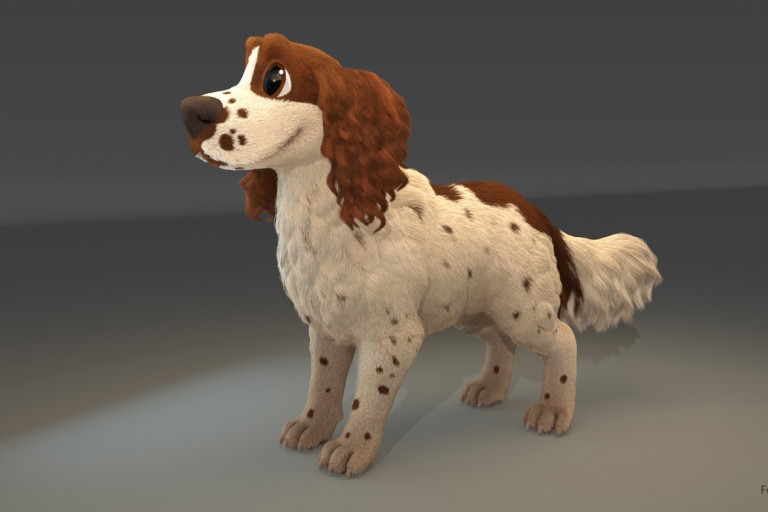
Exploring game technology innovations
Femke Schaars focused her research on grooming and fur simulation. She formulated the research question: 'Which factors are most influential according to industry experts in the creation and simulation of pre-rendered fur on an animated character?' Femke created a 3D model of her own dog and explored how to make its fur appear believable.
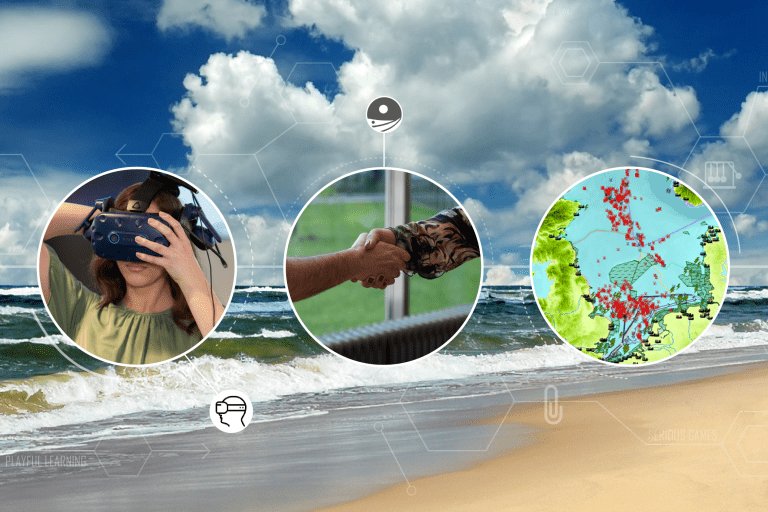
Graphics Programming and Serious Games
In addition to other focus areas, the Master Game Technology programme supports students who wish to specialise in Graphics Programming and Serious Games, guided by senior lecturer Jacco Bikker and professor Igor Mayer.
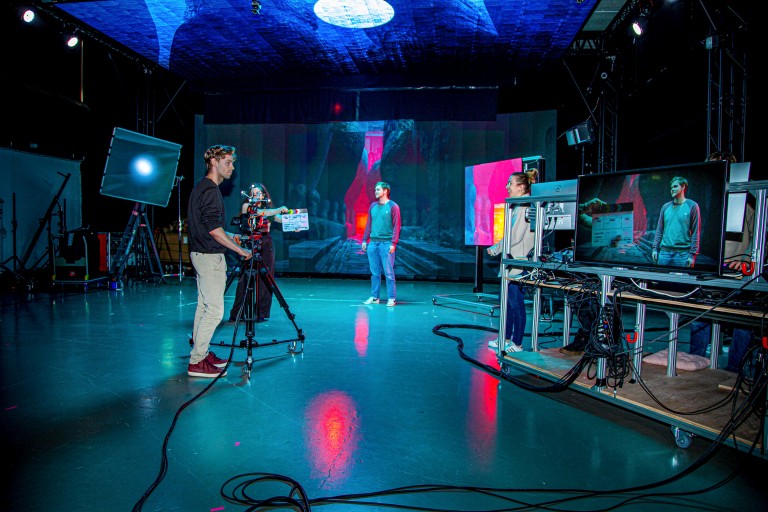
XR Stage
Our XR stage is equipped with state-of-the-art technology, featuring an 8m x 3.5m LED wall and ceiling, an advanced motion tracking system, and real-time rendering powered by Unreal Engine 5. It also includes interactive virtual sets, virtual cameras, XR headsets, and immersive audio integration, providing a cutting-edge environment for innovative projects and research.
Admission & application
- What are the admission requirements?
-
You are eligible if you hold a bachelor’s degree (or equivalent) in any relevant game development area, for example IT, programming, art, animation, design, and production.
Pre-existing knowledge in the field you wish to explore is required. If you wish to make something to substantiate your research, for example a test scene with different mood settings, you will already need to possess the skills required to make that test scene.
- What does this study programme cost?
-
For academic year 2026-2027 the statutory tuition fee for master's programmes is €2,694. In addition, you should take extra costs for software, excursions, etc. into account.
- How can I apply?
-
If you meet the admission requirements, you can apply for this study programme. Application is open until 15 August, but we strongly recommend applying before 1 July to avoid delays due to the summer holidays. This is a selection programme, meaning that only 28 students, distributed across the three disciplines, are admitted each academic year.
What others say about Game Technology

I was given a lot of freedom in what I wanted to research

A great foundation for any job!

I learn a lot from my students
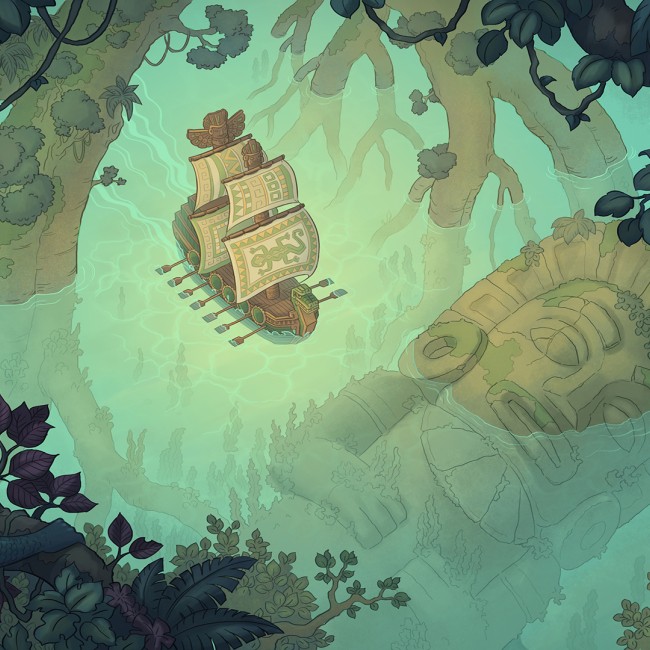
What can you do after your studies?
The Master Game Technology prepares you for future positions such as a specialist in art, programming or design. These positions are no entry-level jobs. A couple of years of work experience within the game industry is essential. With the Master Game Technology, in which you acquire solid academic and applied knowledge, you can achieve these positions faster.
After graduation you are entitled to the degree of Master of Science.
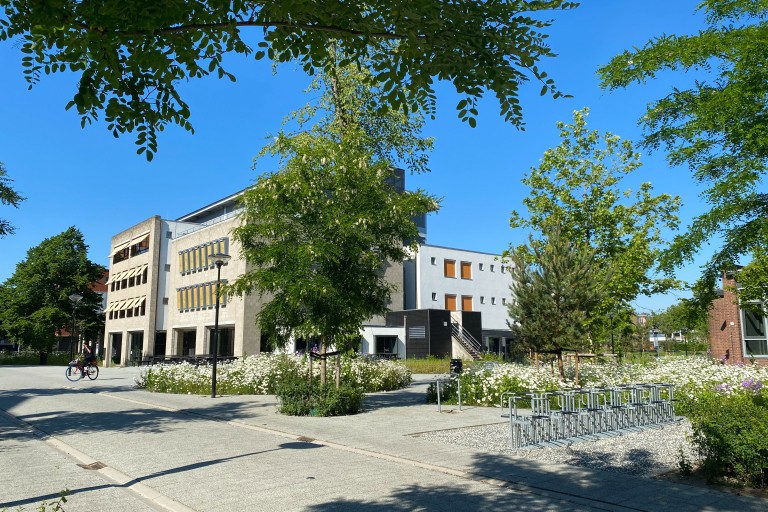
Virtual campus tour
Have a virtual look and discover the Frontier building where you’ll be studying and what more the campus has to offer.
Get inspired!
Read more about projects, research and insights in the games industry.

Help with choosing your study programme
Do you want to continue after your bachelor's or further develop your professional skills and are you looking for a master's? Discover, compare and choose your master's programme at BUas.


